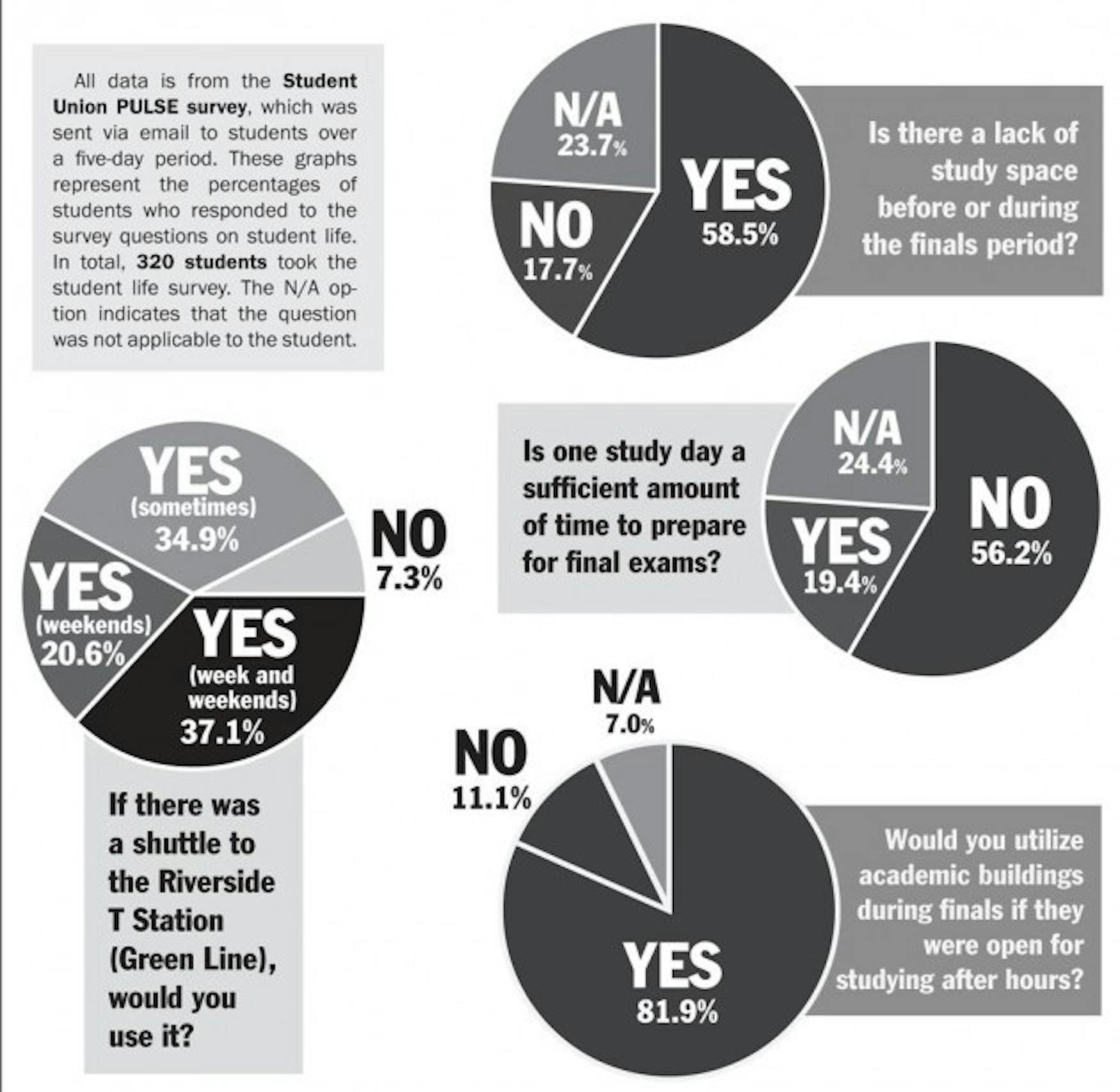Survey shows students want more study areas
According to results from the recent PULSE survey on student life, a slight majority of students are unsatisfied with the amount of study spaces and study days currently available and over a third would use a shuttle to the Riverside MBTA station, if it were in place.
The PULSE survey was sent out to the student body by the Student Union in order to gather feedback on various issues relating to student life. Five sections—dining; housing; student life; Student Union; and "what else," where students could provide feedback on topics not covered in previous sections—comprised the survey.
According to Student Union President Herbie Rosen '12 in an interview with the Justice, 320 students participated in the student life section of the survey, which is about nine percent of the undergraduate population.
Topics covered in the student life section of the survey included study days, study spaces, transportation, relationships with faculty and advisers, extracurricular activities and health and fitness.
Fifty-six percent of students who took the survey said they were not satisfied with the one study day provided before finals periods, and 58 percent said they would be in support of extra study days even if it resulted in later final periods. In addition, 59 percent indicated that they felt there is a lack of study space on campus, and 82 percent said they were in favor of opening other buildings on campus for studying.
Rosen said that the Student Union will examine the data and look into advocating for student access to more buildings for studying and consider working with the registrar to increase the number of study days. However, this change would not affect the academic calendar for possibly two years because this year's schedule is set and cannot be changed except in certain cases such as cancellation due to weather, according to Rosen.
The survey also gathered information on the most utilized study areas. Fifty-two percent of survey takers said that they studied in their rooms while 28 percent said they studied in the Goldfarb Library. Thirteen and a half percent said they used the Shapiro Campus Center, and seven percent said they studied in their residential lounge.
In regards to transportation, the Boston/Cambridge Crystal Shuttle is the most often used mode of transportation, followed by a student's own car and the Fitchburg line of the commuter rail into Boston.
When asked if they would utilize a shuttle to the Riverside MBTA station, 37 percent of students said they would use the shuttle during both the week and the weekends, while 21 percent said they would only use the shuttle during the weekends. Thirty-five percent said they would use the shuttle "only now and then," and eight percent said they had no use for the Green Line, on which the Riverside stop is located.
Trial runs of a shuttle to Riverside were carried out during the past two weekends in order to gauge student interest in transportation to the station. The trials were conducted by Director of Public Safety Edward Callahan and the Escort Management team in collaboration with Rosen and three other members of the Student Union.
According to Rosen, 71 students used the shuttles during the first weekend of trials. As of press time, Rosen did not have the amount of students who took the shuttles this past weekend.
Rosen said that he will examine that number and speak with the Graduate Student Association to discuss graduate student interest in using the shuttles.
In addition, the survey asked if the Waltham shuttle times were compatible with students' class schedules. In a Nov. 10, 2010 email to the Brandeis community, then-Provost Marty Krauss announced that she accepted recommendations from the Block Scheduling Committee that included starting classes on the hour or the half-hour, rather than ten minutes after. This schedule change was implemented for the fall 2011 semester, and Rosen said that he and the Student Union were interested in seeing if that had an impact on student transportation.
"We were concerned about the Waltham Crystal shuttles because they didn't change their schedule after the academic schedule got changed," said Rosen. Thirty-eight percent of students said that the shuttle times worked well with their classes, while 16 percent said that they did not.
Rosen said that he will hold a follow-up meeting with Callahan after the Thanksgiving holiday break to discuss the results of the survey.



Please note All comments are eligible for publication in The Justice.